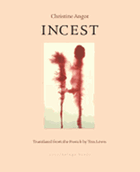
French author Christine Angot's controversial 1999 autobiographical novel Incest, now translated into English by Tess Lewis, confronts brutal questions of forbidden sexuality with raw force and invasive prose.
In the wake of a recent, tumultuous break-up, single mother Christine recalls the months leading up to this moment, as she fell into her first homosexual love affair. With increasing urgency and hysteria, she recalls the neuroses and anxieties associated the relationship. As the narrative builds toward their final days together, Christine must finally dive into the traumatic secrets of her adolescence, exploring the eroticism, humiliation and devastation of her incestuous relationship with her father.
Written in emotional, stream-of-consciousness prose, Incest can often feel agitated and erratic, perfectly capturing the shattered inner world of its narrator, who is suggested throughout to be the author herself. As she blurs the lines between reality and fiction, Angot insists upon unsettling her reader, in terms of her meta approach, her taboo material and her polemic style. Together, these elements deliver a devastating exploration into the self-loathing and the disturbing paradoxes of human desire. While her work may trouble readers with its brutal physicality and trembling honesty, the power of these reactions speak most directly to its successes. In refusing to shy away from controversial content, Incest challenges, disgusts and confounds, making it a moving and memorable contribution to contemporary literature. --Alice Martin, freelance writer and editor

